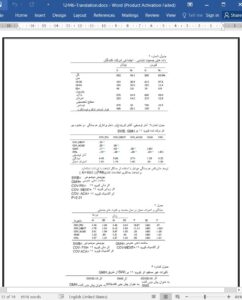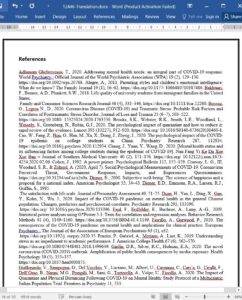Abstract
Background The purpose of this study was to provide an operating mechanism for understanding the effects of COVID-19′s on satisfaction with life, subject to students’ general mental health
Methods A sample of 1653 Greek speaking university students (72.4% females, 65.3% undergraduate, M age=26.1) completed an online survey including measures for perceived psychological, academic, and financial impact of the COVID-19 pandemic, general mental health and satisfaction with life.
Results A mediation model was tested to illuminate these relationships by considering students’ general mental health as a mediator.
Findings demonstrated that there were significant direct effects of perceived COVID-19 impact on participants’ financial status on satisfaction with life and indirect effects of perceived COVID-19 impact on participants’ financial status and academic performance respectively on satisfaction with life through general mental health.
Limitations The study's cross-sectional design, self-report data and snowball sampling.
Conclusions The findings add to our understanding of the relationship between perceived COVID-19 impact and life satisfaction among university students, and they shed light on the critical role of general mental health in mediating the relationship. Targeting the factors that influence general mental health can help to mitigate potential problems while also finding ways to improve mental health and well-being.
1. Introduction
With the discovery of a new infectious coronavirus disease (COVID19) and the onset of the coronavirus pandemic in 2019 (World Health Organization, 2020), the changes imposed on the general population disrupted many aspects of their lives, including their mental health and well-being. The declaration of the COVID-19 pandemic resulted in several countries enforcing a variety of austerity measures to contain the spread of the infectious disease (i.e., social isolation, quarantines, curfews, and partial or nationwide complete lockdowns), significantly affecting people’s way of life and resulting in a number of negative psychological outcomes and feelings (e.g., anger, confusion, distress, loneliness, and depression) (Brooks et al., 2020). The quick rising of such feelings is serious considering their link with various incapacitating mental health illnesses and disorders (e.g., major depression and schizophrenia, obsessive compulsive, trauma-related, panic attacks) (Fiorillo and Gorwood, 2020). Additionally, the prolonged duration of the austerity measures has also increased stress and worrying concerning financial insecurity along with increased fear for supply shortages (Brooks et al., 2020). It seems therefore that the worldwide impact of the pandemic on public mental health and well-being is apparent. Psychiatry and psychiatrists can have a vital part to play in this pandemic and its long-term consequences, especially in dealing with the psychological and mental health aftermath and in solidifying health service mechanisms in reaction to COVID-19.










